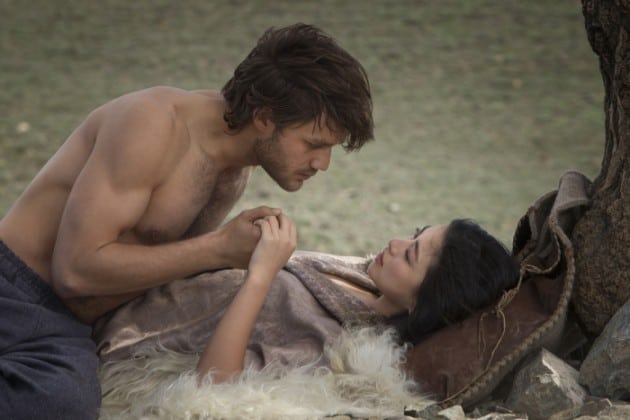
Despite some seriously gratuitous nudity, “Feast” is Marco Polo‘s first fully-formed episode, further developing the lives of Kublai and Jia as they head towards an inevitable showdown over The Walled City. Where “The Wolf and the Deer” stated opaque views of culture and politics, “Feast” digs in a bit further and examines the possible dissolution of both power structures in its world, and how their leaders approach closing these rifts.
Led by the performances of Benedict Wong and Chin Han, “Feast” is a surprisingly intriguing hour, focused on poking Kublai and Jia like the needles in the Khan’s chest as he deals with his gout. For Kublai, the murder of his own brother creates a crisis of faith within the power structure, one that has Chinese and Mongolians alike questioning the rationale of their supposedly-great leader. It brings two interesting bits of character to the forefront: first off, Khai’s relationship with his wife continues to fascinate, one of the few women in the world of Marco Polo who gets to be clothed and influential, guiding her husband through the difficult moral decision to kill his own blood – an act that Kublai clearly carries in this episode, giving the conflict rushed to its climax in the previous episode some much-needed emotional weight here. What is really intriguing is how Chabi understands her place next to the Khan; it is a desired position she holds so close to the Khan’s ear, one that others would try to gain favor of (as we see with the Master of Finance and the aforementioned Naked Tryouts I mentioned earlier). She’s fully aware of how to play the political game – and unlike someone like Mei Lin, doesn’t allow herself to become the pawn of men in their political games. Her protected position as wife and trusted adviser to the Khan is a power she fully realizes; and unlike a lot of other women on the show, who are struggling to become distinct as characters (*cough* Kokochin *cough*), has a magnetic presence on-screen.
The other interesting facet of Khan’s character in “Feast” is the conviction he harbors for his actions; whether it was the right or wrong decision, “Feast” sees Khan questioning himself on whether it was a necessary decision. Killing his brother could easily be viewed as the end of some jealous feud or petty argument; in reality, it was over a direct conflict in philosophy, a conflict that is only settled by one thing in Mongolian culture – and that’s a awesome fight to the death, which we got last episode. Again, “Feast” gives Ariq’s death some real repercussions, both personally for the Khan, and rippling out into his inner council (led by Ahmad) who believe the Khan’s inner conflict is merely cowardice.
Jia’s story is not nearly as interesting, even given the conviction of The Cricket Master in asserting his new position as protector of the Song dynasty; sure, he kills his most skilled warrior with his praying mantis skills, but it’s a thin act of masculinity only legitimized by the assumptions of the world these characters live in. Is that a smart military strategy? I wouldn’t think so – however, the Jia’s understanding (as well as the Khan’s, to draw an important parallel) of public perception is key in managing an empire, and like the Khan’s decision to take another valuable, comes with many risks and rewards. Does bolstering morale and support through intimidation guarantee victory, or only guarantee that you’ll enter the battlefield with even less people, for an already-uneven fight (the Khan’s got no less than three armies at his disposal, while the entirety of the Song dynasty lives on in one walled city)?
Unfortunately, this show is named Marco Polo, and always returns to the aloof Latin at the show’s center; and whenever that happens, Marco Polo gets considerably less entertaining, a slog through indeterminable dialogue and head-scratchingly awful scenes with opaque mysteries about jewel thieves and how the heck Marco got so adapt at multiple fighting styles so quickly (though Hundred Eyes will always be kicking his butt – or at least until the season finale, I’d imagine). Knowing how important her own virginity was, would a women initiate something with a foreign stranger mere yards away from her father (in between wrestling doubts, no less?). As fun as it was to see Marco’s shocked face when Kaidu mentions her virginity (by the way, Kaidu’s mouth all but guarantees he gets the Ariq treatment), Khutulun is an empty character to this point, an object of presumed power only shown in physical dominance, then stripped away with cheap appeals to sexuality (*cough* Mei Lin… man, I can’t seem to shake this cold!).
Take away the wrestling sequences and all the concubine crap – and what you have is the first intriguing hour of Marco Polo, one that brings new shades to the political and philosophic differences between Jia and Kublai. In the end, however, both men deal with their problems through sheer display of force, which may ultimately reveal the simplicity of Marco Polo‘s ruminations on power (certainly their attempts to give depth to the complicated socio-political positions of women have suffered from this). At least for the events of “Feast”, they prove to be a backdrop more colored and exciting than the lush, expensive scenery and elaborate costumes that occasionally make Marco Polo feel like a hollow, overcrowded production.
Photo via Netflix
 Follow Us
Follow Us





